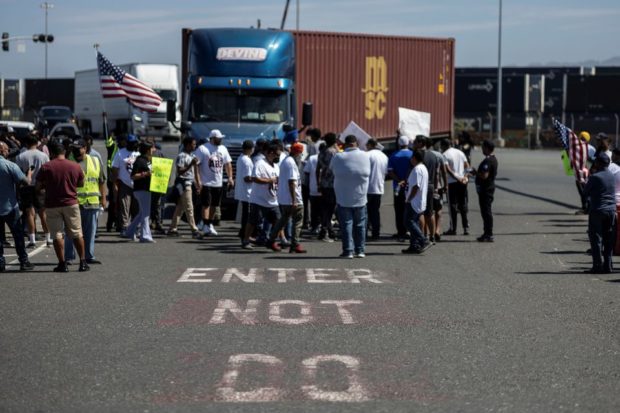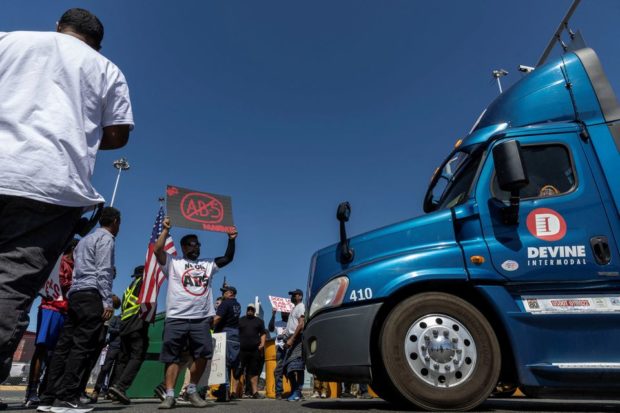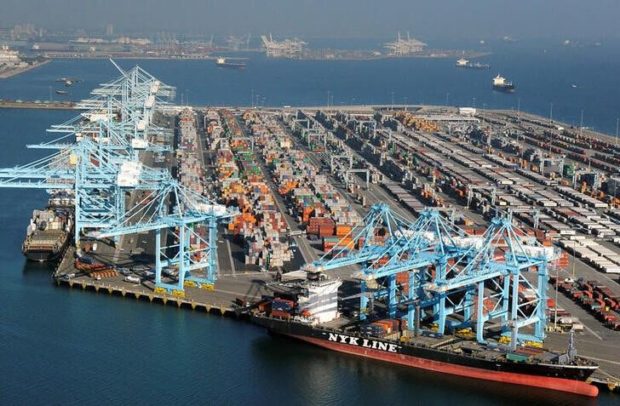Clogged California ports face new labor risk from trucking

Independent truck drivers gather to delay the entry of trucks at a container terminal at the Port of Oakland, during a protest against California’s law known as AB5, in Oakland, California, July 18, 2022. REUTERS
OAKLAND — Truck drivers choked traffic at the Oakland, California, seaport on Monday protesting a state law that makes it harder for independent contractors to transport goods and could limit labor at the state’s already clogged seaports, threatening to worsen the nation’s pandemic-fueled supply chain jams.
California’s ports handle about 40% of container goods that enter the United States. Trucking disruptions come at a time when unions and West Coast port employers are also negotiating a high-stakes labor contract.
The law, known as AB5, or the “gig worker” law, sets tougher standards for classifying workers as independent contractors. Independent truckers who now operate under the authority and insurance of companies that hire them for jobs would be shouldered with the hefty costs and red tape of taking that on when the law is enacted.
“They want to eliminate us,” said independent driver Douglas Urtado, who joined Monday’s protestthe Port of Oakland in the San Francisco Bay Area.
Wayne Feng, wearing a “No on AB5” T-shirt, told Reuters the law would be so financially draining that drivers “aren’t making anything.”
Article continues after this advertisementLegal challenges kept AB5 from going into effect in 2020, but the U.S. Supreme Court last month denied a California Trucking Association petition claiming the law is blocked by federal regulations. Experts say an injunction that put the law on hold could soon be lifted.
Article continues after this advertisement
Independent truck drivers gather to delay the entry of trucks at a container terminal at the Port of Oakland, during a protest against California’s law known as AB5, in Oakland, California, July 18, 2022. REUTERS
More than 100 drivers and small trucking company operators opposed to the law swarmed two terminal gates in the Port of Oakland, slowing truck entry to a trickle. The action came after port truckers in Los Angeles picketed gates and snarled roadways at the nation’s busiest seaport complex last week.
Business owner Josue Mendez, 29, said AB5 would devastate his port trucking firm, which relies on 10 independent drivers to move everything from medical equipment to almonds.
“I can no longer hire them” and be in compliance with AB5, said Mendez.
Backers of AB5, which include the Teamsters union that once dominated trucking, say it will crack down on labor abuses by pushing owners to hire drivers as employees and provide workers’ compensation insurance and other benefits.
Industry groups representing roughly 20,000 Los Angeles and Oakland port truckers, including the Owner-Operator Independent Drivers Association, made an unsuccessful bid to convince California Governor Gavin Newsom to delay enforcement of the law.

Ships gather off the ports of Los Angeles and Long Beach, California February 6, 2015 in this aerial image.REUTERS
“Now that the federal courts have rejected the trucking industry’s appeals, it’s time to move forward,” Dee Dee Myers, director of the Governor’s Office of Business and Economic Development, said in a statement.
California’s port trucking work practices trace back to the 1980s, when the United States deregulated trucking. That transformed the business from one dominated by large, unionized companies to the current model in which most firms rely on independent drivers, many of whom are recent immigrants.
Port driver pay is now one-half to two-thirds less than what it was before deregulation, according to an estimate from Wayne State University economics professor Michael Belzer. It is difficult to derive accurate data on compensation because government data, particularly on hours worked, is incomplete, he said.
RELATED STORIES
Cash truck spill prompts California freeway frenzy
Abandoned trucks litter California highway as wildfire rages
Drought-hit California scales up plan to truck salmon to ocean
WATCH: Truck tips over while trying to navigate tight corner in California